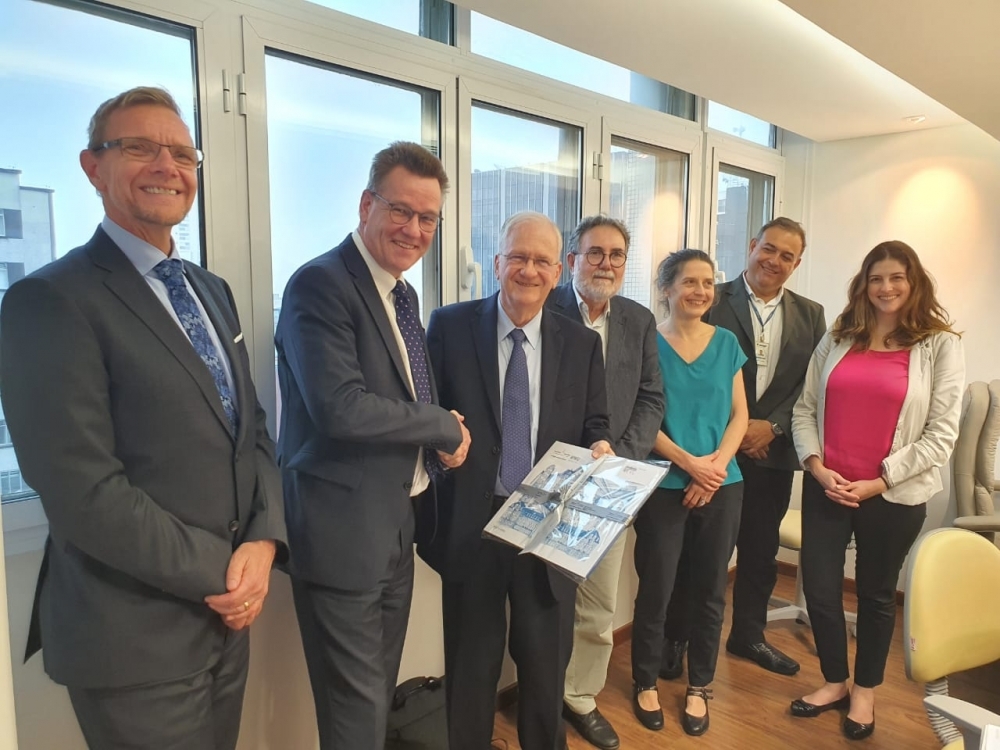

Representatives of the German higher education institution met with FAPESP’s senior executives to talk about their shared commitment to fostering research on sustainability (in the photograph, from right to left: Bernd Hellingrath, Johannes Wessels, Marco Antonio Zago, Carlos Américo Pacheco, Anja Grecko Lorenz, Alexandre Roccatto and Laura Redondo/photo: Agência FAPESP)
Representatives of the German higher education institution met with FAPESP’s senior executives to talk about their shared commitment to fostering research on sustainability.
Representatives of the German higher education institution met with FAPESP’s senior executives to talk about their shared commitment to fostering research on sustainability.

Representatives of the German higher education institution met with FAPESP’s senior executives to talk about their shared commitment to fostering research on sustainability (in the photograph, from right to left: Bernd Hellingrath, Johannes Wessels, Marco Antonio Zago, Carlos Américo Pacheco, Anja Grecko Lorenz, Alexandre Roccatto and Laura Redondo/photo: Agência FAPESP)
Agência FAPESP – Representatives of the University of Münster (WWU) and FAPESP met on February 7 at FAPESP’s headquarters in São Paulo city to discuss strategies for deepening collaboration between researchers in São Paulo state and colleagues affiliated with the German university.
In 2014, WWU and FAPESP signed a scientific and technological cooperation agreement, and since then have issued nine calls for research proposals under the aegis of the São Paulo Researchers in International Collaboration Program (SPRINT), which offers seed funding for international research collaborations.
“We discussed the possibility of promoting bilateral collaboration on more ambitious projects, such as those conducted by FAPESP’s Research, Innovation and Dissemination Centers [RIDCs] or its Engineering Research Centers and Applied Research Centers [ERCs/ARCs],” says FAPESP President Marco Antonio Zago. Carlos Américo Pacheco, CEO of FAPESP, also took part in the meeting.
Both stressed their interest in stimulating projects designed to promote sustainable development, such as the Amazon +10 Initiative, through which research funding agencies (FAPs) in 20 Brazilian states including São Paulo have joined forces to support research and technological innovation in the nine states spanned by the Amazon Rainforest biome (officially known as Legal Amazonia).
One possibility raised at the meeting would entail interaction between researchers affiliated with the centers supported by FAPESP and scientists belonging to WWU’s Clusters of Excellence, which focus on cutting-edge research and are funded by the German federal government as part of its Excellence Strategy. Clusters of Excellence receive funding for a seven-year period, which can be renewed.
“It was a very good meeting. Our relationship [with FAPESP], which has lasted a long time, is even better now. I particularly enjoyed the discussions we had about the Excellence Strategy and how we might collaborate on that front,” WWU Rector Johannes Wessels told Agência FAPESP. “With regard to the topics discussed, it was clear that we share a concern with sustainability, as evidenced by what we’re doing in Münster as part of a network of European universities that focuses on social and economic aspects of sustainability. I expect this to go further and stimulate exchanges among researchers and PhD students.”
The other participants in the meeting included Bernd Hellingrath and Anja Grecko Lorenz, Scientific Director and Executive Director of WWU’s Brazil Center respectively; Laura Redondo de Campos, Director of WWU’s representative office in São Paulo; Nobert Robers, Director of its Press Office; Marcio de Castro Silva Filho, Pro-Rector of Graduate Studies at the University of São Paulo (USP); Niels Olsen Saraiva Câmara, Deputy Pro-Rector of Graduate Studies at USP; and Alexandre Roccatto, Coordinator of Scientific Programs at FAPESP.
Republish
The Agency FAPESP licenses news via Creative Commons (CC-BY-NC-ND) so that they can be republished free of charge and in a simple way by other digital or printed vehicles. Agência FAPESP must be credited as the source of the content being republished and the name of the reporter (if any) must be attributed. Using the HMTL button below allows compliance with these rules, detailed in Digital Republishing Policy FAPESP.





